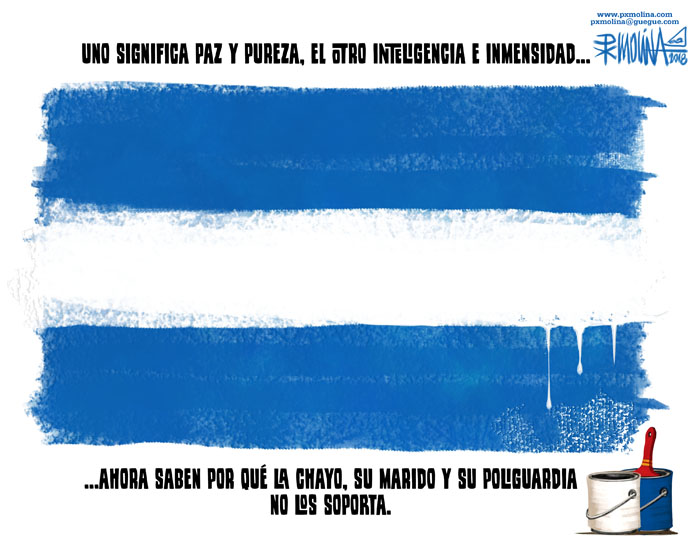14 de enero 2019

Children of Exile: The Births “Sowing Hope” in the Camp of Nicaraguan Farmers

PUBLICIDAD 1M
PUBLICIDAD 4D
PUBLICIDAD 5D
By questioning the power structures from within, the resignation and denunciation of Rafael Solis contributes to the regime’s breakdown.

“Neither forgive nor forget,” sounds good, but… What does it mean within our current context?
The next stage of the struggle in Nicaragua must lead to defining an organization that can bind together and legitimize the self-organized movement; a body that succeeds in uniting us around proposals and ideals that move away from the failures that we’ve experienced. Designating representatives to define the diverse aspirations of each group is a task that’s still pending, and it’s an urgent one.
We need people who can define the slogans of the resistance. We need a consensus regarding what we understand by “democracy” or “freedom” or, for example, this matter of “neither forgive nor forget”.
In the upcoming weeks and months there’ll be those who abandon their support of the Ortega regime.
The case of the Supreme Court Judge Rafael Solis is an interesting example. There are people with fondness for the regime and a history as accomplices whose consciences will at some moment collide directly with their loyalties and their concepts of what should or can be done or not done.
Many, and I repeat, many of us within Nicaraguan society have participated for reasons of ideology or personal history, in episodes that our adversaries would consider profoundly damaging to their right to exist and to live in a certain way.
Many of us, from supporters of Somoza to Sandinistas, from liberals to conservatives, have recognized mistakes we’ve made, abandoned certain behaviors, and ended up swelling the ranks of discontent and condemnation of the crimes that the Ortega-Murillo dictatorship is today committing.
The fact that we’ve reconsidered, evolved and understood the suffering of another, the injustice perpetrated against another, is a sign of growth. It’s an indication of advance towards a state of mind and conscience that’s allowed us, over time, to effect a true reconciliation among Nicaraguans who for years were on opposite sidewalks.
In a situation like our current one, this process will be repeated many times over. Therefore, we should think about how we’re going to face it. The phrase “neither forgive nor forget” absolutely denies those who have erred the opportunity to redeem themselves, accept their mistakes, and come over to the right side of history.
Without a doubt, there are criminal actions that should be considered as such. Without a doubt, some are more responsible than others, and there are those who are stained with innocent blood. There are assassins, there are executioners, but there are also different levels of responsibility and of participation.
In all justice, those levels need to be clearly delineated. That’s why it will be essential to have a Truth Commission that acts within a law that will have to be written, since it doesn’t exist, hear testimony, and determine the charges.
It would be wrong of us, however, to compare the role of a public employee with that of a member of the paramilitary who shot and killed.
The government functionaries, the public employees, even the police who refuse to continue being accomplices of this repressive regime should not be afraid to follow their consciences when they act. Their opportune resignation will certainly count at the moment that the trial of public opinion finds them more or less guilty.
In this situation, a resignation like that of Rafael Solis, a denunciation like his, has value. Its value is unquestionable, given how it contributes to the regime’s breakdown by questioning from within the power structures that have been capable of devastating the country and sinking it into the depths of a bloody dictatorship.
There will always be those who think and say that these are the rats fleeing the sinking ship, but I’d prefer to think that among them are many who will swim towards and reach a safe port. I want to think that our patriotic heart will know how to pardon those prodigal citizens who recognize that they’ve strayed and come back to join the cause of all of us.
Archivado como:
PUBLICIDAD 3M
Poeta y novelista nicaragüense. Ha publicado quince libros de poemas, ocho novelas, dos libros de ensayos, una memoria, y cuatro cuentos para niños. Su primera novela “La mujer habitada” (1988) ha sido traducida a más de catorce idiomas. Ganadora del Premio La Otra Orilla, 2010; Biblioteca Breve, de Seix Barral (España, 2008); Premio Casa de las Américas, en Cuba; Premio Internacional de Poesía Generación del ‘27, en España y Premio Anna Seghers de la Academia de Artes, de Alemania; Premio de Bellas Artes de Francia, 2014. En 2023 obtuvo el premio Reina Sofía de Poesía Iberoamericana, el más prestigioso para la poesía en español. Por sus posiciones críticas al Gobierno de Daniel Ortega y Rosario Murillo, fue despatriada y confiscada. Está exiliada en Madrid.
PUBLICIDAD 3D